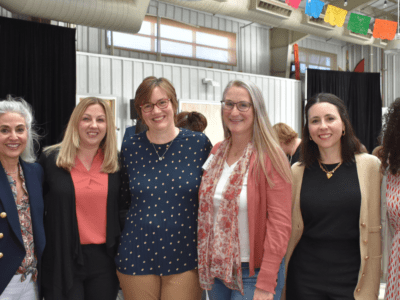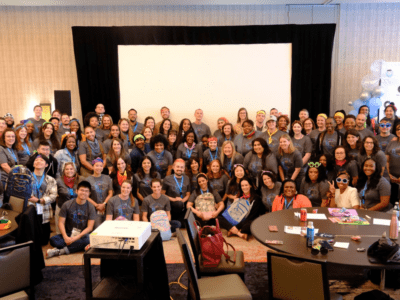Photos by Isabel Lopez Slattery
Taylor Lehman is a mother to three children, and since she had her first baby years ago she has struggled to find child care. In the last decade, child care costs have risen significantly across Michigan, forcing parents to forego employment in order to care for their children.
According to data from the 2022 Kids Count Report from the Michigan League for Public Policy, 44% of children in the state live in households that are unable to afford basic expenses. This includes the costs associated with child care. This same data report shows that parents in Kent County are paying an average cost of nearly 40% of their income on child care.
Even with a full time job with benefits, Lehman still struggles to find affordable care for her children.
“Finding daycare for my youngest has been extremely tough,” she says.
Lehman’s son will be two years old in the spring, and because he’s not eligible to go to school full time yet, she finds herself scrambling every single week to find someone to care for him while she’s at work on Fridays.
“Every Friday I am looking for care and if I can’t find any, I end up having to take paid time off,” she says.
Despite having the flexibility to work from home two days a week, the costs of day care are still an overwhelming burden to her family. Currently, Lehman pays about $40 dollars per day for child care, and she says that’s the lowest she’s been able to find. The average annual cost for full time infant care in the state of Michigan is nearly $11,000 dollars a year – or a little over $900 dollars per month or $45 dollars per day.
Connecting with a supported provider
Fortunately, Lehman got connected with Jen Ruwersma, giving Lehman a much needed respite from having to pay overwhelming costs for care. Taylor feels comfortable leaving her children with Ruwersma. She says she doesn’t question the care they receive; it is truly exceptional.
“I don’t worry about them when they are there. I know they are well taken care of and if for any reason I’m running late or something comes up at work, Jen is flexible with me,” she adds.

Jen Ruwersma at her home child care center.
Even though she had to be on Ruwersma’s waiting list for a while until a few spots opened up, she says she’s grateful she waited and is planning to keep her children there long term.
Ruwersma operates a home child care center in Cedar Springs in Kent County.
“I have 14 kids at a time, with a little bit of a rotation with some kids coming before and/or after school,” she says.
Ruwersma is committed to keeping her costs low, but she struggles to find employees to work at the center.
“Unfortunately, providers cannot reduce our rates too much without impacting our businesses or our own income,” Ruwersma said. “There’s not a huge profit in child care, and to be able to pay our employees a fair wage for what they are doing is increasingly hard.”
Ruwersma is either forced to raise costs of care or keep employees’ wages stagnant so as to make care affordable for families.
Making child care affordable for families is one of First Steps Kent’s main priorities. They are a nonprofit organization that operates independently and collaborates with parents, service providers, stakeholders and advocates to establish well rounded early childhood services in the community.
Ruwersma began working with First Steps Kent when the COVID-19 pandemic first started and she struggled to find personal protection equipment for her employees and the children she cared for.
“It was nearly impossible to find things like hand sanitizer and disinfecting wipes. And those are all items that child care providers are required to use in order to be in compliance with licensing,” she said.
She worked with First Steps Kent to get some of these items at no cost to be able to stay open to serve families.

Jennifer Headley-Nordman, far left, in training with other staff of First Steps Kent.
First Steps Kent supports child care providers
Jennifer Headley-Nordman has been president of First Steps Kent since October 2022. She says the shortage of child care options has created a crisis for families.
“When we talk about accessibility we’re really talking about things like: do we have quality child care, that’s also convenient, that’s located in the families’ communities so that parents can make sure that their children are nearby?” she says.
Quality child care leads to better development outcomes for children, including readiness for kindergarten.
“Our goal is to try and identify child care deserts within our communities so we can coach and encourage those individuals who are interested in working in the sector to be able to do it,” Headley-Nordman adds.
This includes helping those individuals become trained and licensed, so that they can offer the best quality child care possible.
Joslyn Ward echoes Headley-Nordman’s concerns. Before the pandemic began, she ran a child care from her home.
“I ran an in-home daycare, one year before my oldest son was born. I chose to do that, because my husband and I knew how expensive child care was,” she said.

Joslyn Ward with one of her children.
Opening up a home day care allowed Ward to stay home with her son while also making an income taking care of other families’ children. Despite wanting to stay open, Ward had a hard time making much profit from her business. “Financially, it was pretty hard, because all of the money that I was making for my daycare was essentially going to the assistant that I had hired. So I wasn’t making any money,” she adds.
While Ward had to put her dream of opening her own child care business on hold for the time being, she continues to be involved in the space by helping other families learn how to access affordable child care resources. With basic grocery items, gas prices and housing costs increasing in the last year and a half, middle to low income families are finding it even more difficult to afford child care, explains Ward. “People’s pay hasn’t necessarily gone up, so, because parents can’t afford it, they will do whatever they can to try and find someone to watch their child – which sometimes might end up being somewhere or with someone that’s not the safest or most appropriate place,” she says.
Finding solutions to disparate access to care
Ward says this disparity impacts families of color living in Grand Rapids the most.
“Kent County is a resource rich community, we have so many resources available for parents here, but Black and brown parents are excluded out of them,” she says.
Part of that is the lack of knowledge, she says, as many parents don’t know what resources are available to them. But the other problem is when families do access these programs they aren’t served by people who look like them.
“So there’s a lot of families in these communities that don’t trust people, because they don’t look like them,” she says. “And so there’s these programs and services out there but there’s no one there that can relate to them.”
First Steps Kent has been working to change that. Before the 2018 midterm election, the organization took charge in leading a campaign in favor of the approval of the county’s first tax millage to fund early childhood education. The tax millage was approved by voters later in 2018. Witnessing this work is what interested Yazeed Moore, W.K. Kellogg Foundation senior program officer, in supporting their work.
“We are one of the very few areas in the country that has a dedicated local millage that’s geared toward providing opportunities across the gamut of the early childhood space,” he said. “[First Steps Kent was] quick in identifying those needs and saw an opportunity to provide additional dollars to providers and parents and support the early childhood work in Grand Rapids.”

One of Joclyn Ward’s children playing.
Developing systemic solutions
Today, First Steps Kent is the administrator of the millage, and they serve to convene and collaborate with community members to help establish a system within the county that ensures children are healthy and developmentally on track and kindergarten ready.
“We know that across Kent County we have a teacher and child care shortage, so we are working with different organizations throughout the county to try to encourage individuals either through job and career readiness or through our local school districts to encourage people to go into that field,” Headley-Nordman shares.
Finding a child care provider for those parents who work second or third shift can be particularly difficult for many, especially single parent households. Headley-Nordman says First Steps is working to fill in these gaps.
“We’re needing to look for second and third shift opportunities for child care, we’re needing to look at weekends and drop in options,” she says. “Not everyone has a set schedule in terms of their work. And so we need to be responsive to what the needs of individuals are in terms of when they’re looking to access quality child care.”
While finding sustainable solutions to the child care shortage will take time, Headley-Nordman is working with child care providers like Ruwersma to provide long term alternative options.
Ruwersma is in the process of opening up a child care center outside of her home in a facility that would not only offer services to children but also provide a space for elders. She says the idea began when she heard that a nearby senior center was forced to shut down.

Ruwersma, front row center right, in black checkered coat, with supporters of The Village.
“When I was little, my grandmother was the most important person in my entire life,” she says. “I remember all of those interactions I had with her. And they didn’t involve money, or expensive toys or video games or any of that stuff because she didn’t have it — it was baking cookies with playdough. And those memories are what I treasure so much.”
Her goal now is to provide the kids in her community the opportunity to experience some of those same interactions with the seniors in the center, called The Village.
“The kids get opportunities to interact with seniors and the seniors get a sense of purpose,” she adds.
To date, Ruwersma is on track to open The Village by the end of the year. She hopes it will not only provide more opportunities for affordable child care in the area, but also a space for community and belonging.
Read More
- Every Child Thrives, “Better spaces, better early childhood learning in Grand Rapids”
- Every Child Thrives, “Battle Creek early childhood system builds resilience to weather child care crisis”
- Every Child Thrives, “Ensuring equitable early childhood education in Battle Creek’s communities of color”
- Every Child Thrives, “A Detroit case study in quality childcare and equitable funding”
- Every Child Thrives, “Working moms are critical to a thriving economy. It’s past time to support them.”









Comments